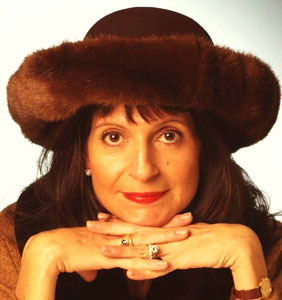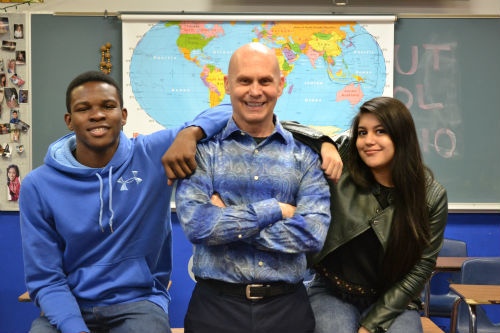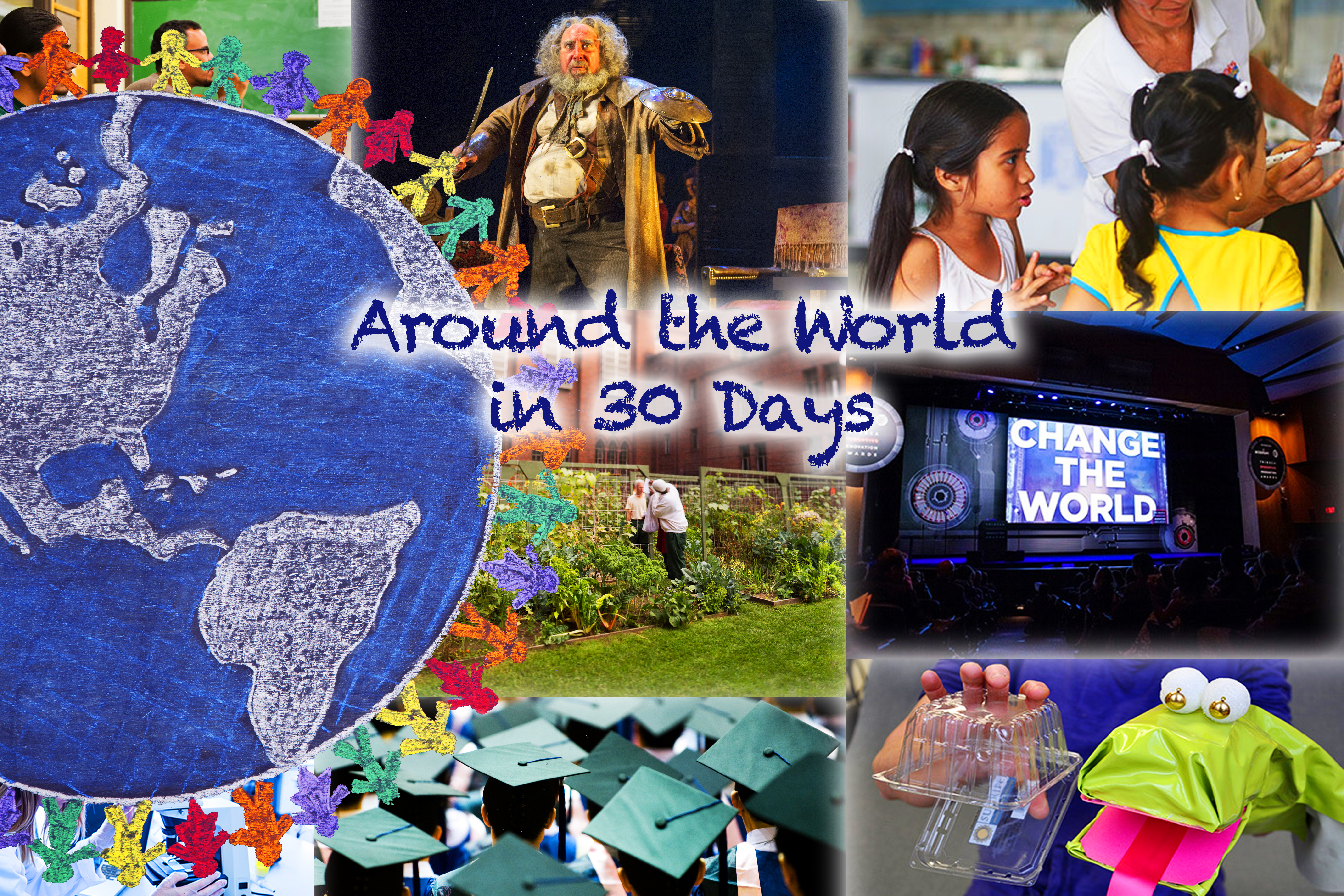
Este mes, I continued my conversations with leaders from around the world on today’s pressing issues in education – from the challenges of graduates seeking jobs to the psychological burden of bullying, from the Japanese academic community’s protests for peace to the International Baccalaureate’s commitment to multiculturalism. Mientras tanto, locally in New York, I learned how BAM (Brooklyn Academy of Music) and other Arts organizations are helping to complete the comprehensive Cultural Plan for New York City, which aspires to bring arts education to every school in the city. BAM is using new technology to bring their work into classrooms worldwide, making their platform accessible to young audiences and students anywhere at any time.
La Búsqueda Global para la Educación de core mission is to promote sustainable change through global discourse, and so I couldn’t be happier than to talk with George Rupp (former President of Rice University, Universidad de Columbia, y el Comité Internacional de Rescate) about his new endeavor as Chair of the International Baccalaureate’s Board of Governors. This program, offered in 146 países, is among our favorites as it gives students the perspectives of other cultures, societies and countries through its rigorous criteria for graduation: los estudiantes deben tomar seis cursos interdisciplinarios, escribir un trabajo de investigación, y servicio a la comunidad completa.
In Rupp’s new position, I learned that he’s working towards fostering multicultural competence and building more relations with underrepresented regions of the world. His goals are ones that all institutions should aim for. As he says, “Educación que es académicamente riguroso, deliberadamente multicultural, and concerned with developing personal values that include a commitment to community service, is an invaluable resource for any and all of us.”
I received many emails in the past few months from scholars appealing Japan’s attempt to lift the constitutional ban on collective self-defense (CSD). If CSD is lifted, this could reignite participation in war for a country that has had its fill of battle. As I looked more into it, I was happy to support this cause, which grew to include over 9000 estudiosos. I talked to Dr. Manabu Sato (Profesor Emeritus, Universidad de Tokio), who co-led the initiative called Association of Scholars Opposed to the Security Related Bills. Sato calls the bill “not simply unconstitutional but also an attack on the key principles of constitutionalism and the rule of law,” adding that we also need to “challenge the hypocrisy exhibited by many Western governments, incluyendo los EE.UU., que por lo general la bienvenida el intento del gobierno de Abe para levantar la prohibición de la CDS, under the name of ‘pro-active contribution to peace’ through which Japan plays a bigger role in defending the ‘rule of law’ en el contexto de los conflictos marítimos y territoriales de Asia.”
In July, I asked our global teacher bloggers about a pertinent and poignant issue: acoso. DR. Tracey C. Burns, a Project Leader at the OECD in Paris and a global expert on bullying, confirms that “a huge amount of political attention is being paid to the issue.” Statistics repeatedly show the prevalence of bullying in American schools, and new research suggests that social media has brought school bullying into the home. Many bold recommendations were offered from teachers, all of whom brought their personal experience to tackling this difficult issue. Guest blogger James Alan Sturtevant recommended reaching out to bullies – señalando que “harsh consequences don’t always work, can make bullies worse, and sometimes evoke retribution for unfortunate victims.” And Pauline Hawkins cautioned that anti-bullying programs in schools will have little influence on students if the adults in their lives are not teaching and modeling respect.” We also heard from Australian expert Lisa Currie (Creador del Proyecto Generosidad Ripple), who recommended the practice of fostering kindness in schools and offered many real world examples of how to do this.
While many think of New York and California as the go-to places for post-college jobs, a recent report has shown that actually Massachusetts, Delaware, y Washington tienen el mayor número de ofertas de trabajo por cada graduado de la universidad. I got to talk this month with Anthony P. Carnaval, the report’s lead author and the director of Georgetown University’s Center on Education and the Workforce. For parents and students anxious about the meagerness of today’s job market, Carnevale has given a report, which as he says, tiene “the ability to connect real people with real jobs in real time.” His report has remarkable findings that will be a boon to anyone who wants to know about the reality of post-college life. One of many insights this report provides is that “desarrolladores de software, enfermeras registradas, and managers are among the most in-demand professionals in every state.”


Únete a mí y reconocidos a nivel mundial los líderes de opinión, incluyendo a Sir Michael Barber (Reino Unido), DR. Michael Bloquear (EE.UU.), DR. Leon Botstein (EE.UU.), Profesor Clay Christensen (EE.UU.), DR. Linda Darling-Hammond (EE.UU.), DR. MadhavChavan (India), El profesor Michael Fullan (Canada), El profesor Howard Gardner (EE.UU.), El profesor Andy Hargreaves (EE.UU.), Profesor Yvonne Hellman (Países Bajos), Profesor Kristin Helstad (Noruega), Jean Hendrickson (EE.UU.), Profesor Rose Hipkins (Nueva Zelanda), Profesor Cornelia Hoogland (Canada), Honorable Jeff Johnson (Canada), Señora. Chantal Kaufmann (Bélgica), DR. EijaKauppinen (Finlandia), Secretario TapioKosunen Estado (Finlandia), Profesor Dominique Lafontaine (Bélgica), El profesor Hugh Lauder (Reino Unido), Señor Ken Macdonald (Reino Unido), Profesor Geoff Masters (Australia), Profesor Barry McGaw (Australia), Shiv Nadar (India), Profesor R. Natarajan (India), DR. PAK NG (Singapur), DR. Denise Papa (Estados Unidos), Sridhar Rajagopalan (India), DR. Diane Ravitch (EE.UU.), Richard Wilson Riley (EE.UU.), Sir Ken Robinson (Reino Unido), Profesor Pasi Sahlberg (Finlandia), El profesor Manabu Sato (Japón), Andreas Schleicher (PISA, OCDE), DR. Anthony Seldon (Reino Unido), DR. David Shaffer (EE.UU.), DR. Kirsten Immersive Are (Noruega), Canciller Stephen Spahn (EE.UU.), Yves Theze (LyceeFrancais EE.UU.), Profesor Charles Ungerleider (Canada), Profesor Tony Wagner (EE.UU.), Sir David Watson (Reino Unido), Profesor Dylan Wiliam (Reino Unido), DR. Marcos Wormald (Reino Unido), Profesor Theo Wubbels (Países Bajos), El profesor Michael Young (Reino Unido), y el profesor Zhang Minxuan (De China) a medida que exploran las cuestiones de educación cuadro grande que todas las naciones se enfrentan hoy.
La Búsqueda Global para la Educación Comunitaria Página
C. M. Rubin es el autor de dos ampliamente leído serie en línea por la que recibió un 2011 Premio Upton Sinclair, “La Búsqueda Global para la Educación” y “¿Cómo vamos a Leer?” Ella es también el autor de tres libros más vendidos, Incluido The Real Alice in Wonderland, es el editor de CMRubinWorld, y es una Fundación Disruptor Fellow.
Siga C. M. Rubin en Twitter: www.twitter.com/@cmrubinworld





Comentarios recientes